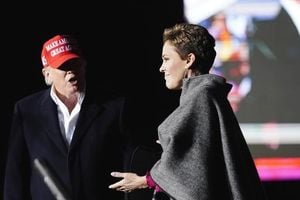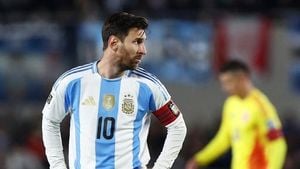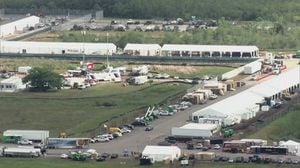VATICAN CITY — As the conclave to elect a new pope unfolds, Catholic cardinals find themselves in a scene reminiscent of Hollywood drama. Some of the 133 high-ranking clerics set to enter the Sistine Chapel on Wednesday, May 7, 2025, have turned to the Ralph Fiennes movie "Conclave" for insights into the complex and secretive process they are about to engage in. “Some have watched it in the cinema,” a cleric involved in the real event admitted to POLITICO.
The movie, which portrays intense rivalries and political maneuvering among cardinals, parallels the real-life drama that is currently playing out within Vatican walls. The film features a cleric who unexpectedly arrives at a secret meeting, igniting infighting and dredging up buried scandals for political gain. This scenario is not far from the truth as the cardinals prepare to elect the next pope amidst their own internal conflicts.
Cardinal Kevin Farrell, an American, is steering the assembly, which has been marked by whispering campaigns against front-runners Cardinal Pietro Parolin, a 70-year-old Italian diplomat, and Cardinal Luis Antonio Tagle, 67, from the Philippines. The stakes are high, as the age-old adage goes: He who enters a pope, leaves a cardinal.
Parolin has already made headlines by revealing the existence of two letters from the late Pope Francis, which stated that one cardinal should be barred from the vote. The letters were read aloud during the conclave preparations, adding to the tension among the cardinals. “Each scene is worth a thousand words,” Cardinal Michael Czerny remarked, acknowledging the film's influence on the perceptions surrounding the conclave.
As the cardinals gather in Vatican City from various dioceses around the globe, they are navigating an environment rife with media scrutiny. Reporters swarm them at every turn, capturing their movements and conversations. The Italian daily Corriere della Sera reported an amusing incident involving a cardinal who unwittingly consumed all the liquor from his guesthouse minibar, only to find the charges on his bill later, leaving him quite upset.
Among the cardinals, the Italians appear particularly adept at leveraging intrigues to gain an advantage over their rivals. This year’s conclave has also seen the unexpected presence of Cardinal Giovanni Angelo Becciu, who was convicted of embezzlement and fraud in 2023 and sentenced to 5½ years in prison. Many had assumed he would not dare show his face, yet he argued for his right to participate in the conclave, claiming that his title as cardinal had not been revoked.
The drama escalated when Parolin produced the letters from Pope Francis, which explicitly barred Becciu from entering the Sistine Chapel. “One can only imagine Becciu’s face the moment that letters signed by the pope were suddenly produced,” noted Austen Ivereigh, a seasoned Vatican observer. In a surprising turn, Becciu decided to withdraw from his demand to vote, citing the need to preserve the conclave's serenity. “I have decided to obey the will of Pope Francis, as I have always done,” he stated.
This move sparked debate among cardinals sympathetic to Becciu, who questioned the legal weight of the letters since they bore only the pope’s initial rather than a full signature. Meanwhile, concerns have been raised about Parolin’s health after reports emerged that he suffered a sudden bout of high blood pressure, although Vatican spokesman Matteo Bruni denied the claims of medical assistance.
Cardinal Tagle, often referred to as the “Asian Francis” due to his approachable demeanor, has also faced scrutiny. A video surfaced of him singing John Lennon’s "Imagine," which conservative Catholic advocacy group LifeSiteNews labeled an “atheist anthem.” The clip quickly went viral, drawing attention to Tagle’s popularity and the challenges he faces as a potential pope.
Additionally, the organization BishopAccountability.org held a news conference where they accused both Tagle and Parolin of failing to adequately investigate clerical sexual abuse cases. Anne Barrett Doyle, co-director of the group, expressed her concerns, stating, “Today we’re just looking at the two front-runners.” She added that while she hadn’t found evidence of direct involvement in cover-ups, the scrutiny was inevitable given their statuses as papabili, or candidates for the papacy.
The conclave, steeped in tradition and secrecy, is not just a political event; it’s a moment of profound significance for the Catholic Church. As cardinals prepare to cast their ballots, they are acutely aware of the weight of their decisions, knowing that the next pope will shape the church’s future.
As the world watches, the intersection of film and reality continues to blur, with the lessons from "Conclave" resonating in the hallowed halls of the Vatican. The cardinals are not merely participants in a ritual; they are actors in a drama that has captivated the faithful and the curious alike.
With the conclave set to commence, the stakes are higher than ever, and the outcome remains uncertain. Who will emerge as the new leader of the Catholic Church? Only time will tell, but one thing is for sure: the drama surrounding this election is real and unfolding in ways that even Hollywood could not script.




